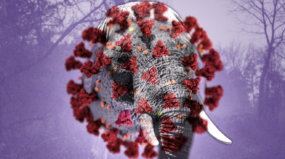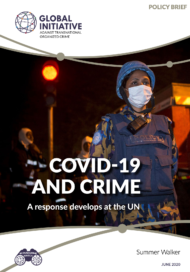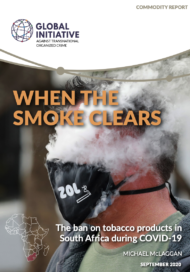Posted on 27 May 2020
As we see clean skies above formerly polluted cities, many environmentalists are celebrating the reduced impact on nature from the lowered consumption of fossil fuels and human activity. Most have not yet fully considered, however, other links between COVID-19, environmental governance and sustainability, or other unfolding criminal risks connected to the same crimes that helped cause the pandemic.
Wildlife trafficking: on the origins of COVID-19
Where there is a mix of live animals or animal products, unhygienic conditions and overcrowding, the potential spread of diseases is far higher – as was the case at the live animal market in Wuhan, China, where the transfer of SARS-CoV-2 appears to have originated.
The ancestral host of COVID-19 is probably one of the species of horseshoe bats. Despite speculative links to pangolins, the host animal that transmitted this disease to a human has not yet been identified. As the Global Initiative previously highlighted, illegal markets increase the risk for the transmission of zoonotic diseases, which has fuelled the pandemic.
Wild animals, either live or as by-products, are marketed worldwide as pets, meat, traditional medicine, as part of private collections, or for the manufacture of different consumer products. This demand is often supplied through illegal markets, both physical and virtual. To supply this trade, various species of fauna are captured or reproduced once collected or in captivity. In both cases, contact with people facilitates the transfer of pathogens.
The illegal online market
With access to physical wildlife markets now restricted, the online wildlife trade appears to have boomed, like certain other illicit markets in the time of quarantine. On 7 May, Facebook and Google reported removing ‘several million’ advertisements related to China’s illegal wildlife trade. What we know indicates that this illegal trade ranges from simple e-commerce platforms to specialized groups in social networks, or potentially in hidden networks – such as the dark web.
Payment methods used for the purchase of various illicit products are often difficult to monitor, and include the use of cryptocurrencies (e.g. Hot Dollars, or HDS). Such payment methods have been identified in advertisements for the illegal sale of wildlife. Other modalities used to adapt to the new COVID-19 restrictions are linked to other crime types, and involve, for instance, courier or delivery shipments, thus weakening the monitoring and control of supply chains.
Vulnerabilities from weakened enforcement capacity
In some places, COVID-19 has caused an increase in wildlife crime as law-enforcement authorities that are usually in the field controlling highways and checkpoints have been deployed to other areas as part of the broader response. Many of these agencies already faced personnel shortages prior to the pandemic, and now their logistical and technical capacity has been weakened further, opening doors to potential illegal cargo exits on various unprotected routes.
In many countries, the armed forces are guarding the streets due to citizen security issues, and to safeguard confinement measures aimed at reducing the spread and transmission of COVID-19. In the same way, this has had the effect of constraining the safeguarding of protected natural areas, as, in many cases, the number of park rangers has been minimized because of pandemic restrictions. There has already been news of alarm in national parks in Africa. Other points that may be vulnerable are control processes for wildlife breeding sites for legal trade, which may be facilitated by the illegal trade in, for example, illegally caught animals.
The critical role of good governance
From China’s failure to regulate illegal wildlife trade to national failures to recognize the virus as a potential emergency, and instead resorting to blaming others, ineffective governance among global superpowers has contributed to the novel coronavirus outbreak. This type of short-sighted poor governance has led, and will continue to lead, to devastating consequences for humankind.
With considerable evidence suggesting COVID-19 first emerged in a wildlife market, China acted to permanently ban the trade in and consumption of wild animals. For now, the list includes domestic animals (dogs, cats) and wildlife species, such as frogs, turtles, bats and snakes, but has yet to be finalized. Unfortunately, there are still no restrictions on the use of animal products in traditional Chinese medicine (TCM).
Last year, the World Health Organization gave TCM the green light as an accepted medical practice following extensive lobbying by proponents. As long as the law does not bite, individuals will seek to profit from these opportunities. Even as the ban tightens, and as is often the case with environmental crime, a bubble effect is bound to occur as organized crime groups will use this opportunity to hide deeper in the folds of illegal trade.
Good environmental governance informs efforts to achieve equilibrium between the right to develop on the one hand, and the sustainable use of natural resources on the other. One of the reasons the global economy is now in recession is because the system upon which it has functioned was not sustainable. A good example of a sturdy, guiding hand during this COVID-19 crisis has been New Zealand’s prime minister, Jacinda Ardern, who has refused to discard environmental standards to meet emergency demands.
Policymakers need to recognize that symbiotic relationships exist between environmental crime and financial crime, corruption and various other forms of transnational organized crime. Environmental crimes are often predicate offences to these other crimes, which should be considered as aggravating factors to the environmental crime itself. Taking environmental crimes seriously will also ensure that sufficient resources are allocated to the response.
Another recommended policy is to strengthen the ‘one health’ approach that highlights the close relationship between human, animal and ecosystem health. This approach also provides zoonosis-risk-reduction guidance through comprehensive responses by multiple sectors and professionals related to the health of human and animal populations, as well as the environment.
Without data or reliable evidence, authorities often fail to allocate resources for environmental-crime investigations – and without investigations, there will be no legal cases. As the world has been transformed by COVID-19, it is sobering to consider that the tragedy of this pandemic might have been prevented with more stringent laws against environmental crime. Recognizing the relationship between weak environmental governance, sustainability and COVID-19 is crucial, but it can only be a positive thing if enforcement is effective.



